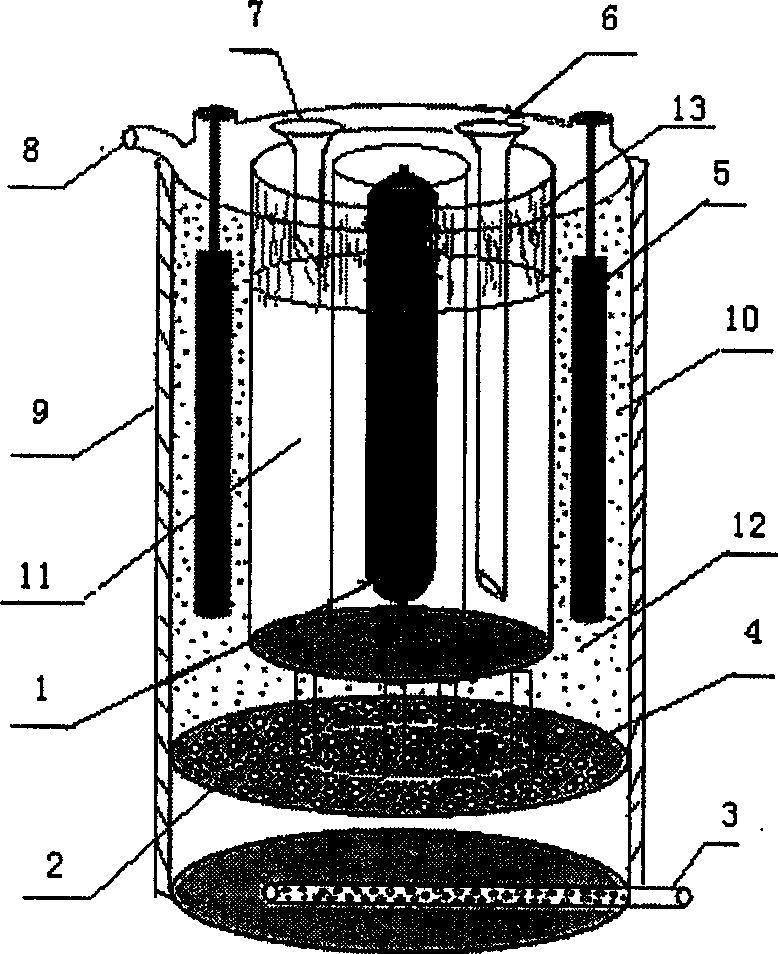Synthesis technology of magnet carried photocatalyst composite particle, sewage purification method and device
A photocatalyst and composite particle technology, which is applied in the direction of catalyst activation/preparation, chemical instruments and methods, light water/sewage treatment, etc., can solve the disadvantages of small nano-powder particles, unfavorable recovery and reuse, separation and recovery difficulties, and limit practical applications and other issues to achieve good synergistic effects, reduce costs, and improve the efficiency of photocatalytic reactions
- Summary
- Abstract
- Description
- Claims
- Application Information
AI Technical Summary
Problems solved by technology
Method used
Image
Examples
Embodiment 1
[0031] The photocatalytic reaction device of the present invention ( figure 1 , figure 2 ) before working, feed the condensed water 6 to make the water flow in the hollow interlayer of the quartz sleeve 11, and take away the heat generated by the high-pressure mercury lamp 1, so as to ensure that the photocatalytic reaction is carried out at a constant temperature. After the aeration device is ventilated, the aeration tube 3 evenly covered with pores will evenly emerge, and under the action of the combined air distribution plate 2, the gas will be more dispersed and agitated, so that the photocatalyst 10 and the sewage are evenly mixed. Simultaneously, air is introduced to provide the required reactant oxygen. Under the action of the bias electrode 5, TiO is generated on the titanium plate 2 , participate in the photocatalytic reaction and improve the photocatalytic efficiency. The outer wall of the quartz casing and the inner wall of the plexiglass container are ground, a...
Embodiment 2
[0035] The degradation experiment of magnetically supported photocatalysts on saline organic sewage, under the same conditions, through the photocatalyst TiO 2 / SiO 2 / Fe 3 o 4 For the degradation of methyl orange wastewater containing 1%, 1.5%, 2.0%, and 2.5% of NaCl mass fraction (concentration is 20mg / L), the catalytic degradation of high-salt organic sewage that cannot be degraded by traditional biochemistry is investigated by magnetic-loaded photocatalysts performance. Depend on Figure 10 It can be seen that under certain conditions, with the increase of salt content, the photocatalyst TiO 2 / SiO 2 / Fe 3 o 4 The degradation rate of dye wastewater is almost unaffected, and the degradation rate increases with the increase of the light time. After 20 minutes, the increase gradually stabilizes, and the degradation rate reaches more than 95%, which shows that the magnetic photocatalyst can degrade organic salty sewage very effectively. At present, conventional methods...
Embodiment 3
[0037] The degradation experiment of magnetically supported photocatalysts on phenol-containing wastewater, under the same conditions, through the degradation of wastewater with different concentrations of phenol, the TiO 2 / SiO 2 / Fe 3 o 4 Catalytic degradation performance for refractory phenol wastewater.
[0038] Test item: Volatile phenol content (GB / T7490-1987)
before processing
50mg / L
(1h)
100mg / L
(1.5h)
200mg / L
(2h)
300mg / L
(2h)
400mg / L
(2h)
500mg / L
(2.5h)
1000mg / L
(3h)
11.8mg /
L
43.3mg / L
43.6mg /
L
39.5mg /
L
58.4mg /
L
103mg / L
168mg / L
Degradation rate
76.4%
56.7%
78.2%
86.8%
85.4%
79.4%
83.2%
[0039] It can be seen from Table 1 that the degradation effect of the magnetic-supported photocatal...
PUM
| Property | Measurement | Unit |
|---|---|---|
| particle diameter | aaaaa | aaaaa |
Abstract
Description
Claims
Application Information
 Login to View More
Login to View More - Generate Ideas
- Intellectual Property
- Life Sciences
- Materials
- Tech Scout
- Unparalleled Data Quality
- Higher Quality Content
- 60% Fewer Hallucinations
Browse by: Latest US Patents, China's latest patents, Technical Efficacy Thesaurus, Application Domain, Technology Topic, Popular Technical Reports.
© 2025 PatSnap. All rights reserved.Legal|Privacy policy|Modern Slavery Act Transparency Statement|Sitemap|About US| Contact US: help@patsnap.com



